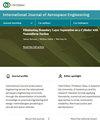Model-Free Robust Backstepping Adaptive Cruise Control
IF 1.2
4区 工程技术
Q3 ENGINEERING, AEROSPACE
引用次数: 1
Abstract
This paper studies the model-free robust adaptive cruise control problem of a vehicle with unknown nonlinear dynamics and disturbances. First, under backstepping control framework, the position tracking errors with different spacing strategies are used to design a virtual control law, which provides a velocity reference. Then, a novel data-driven sliding surface whose parameters are updated by designing estimation algorithm is developed to handle the unknown uncertainties and disturbances. Finally, the model-free robust backstepping adaptive cruise control (MFRB-ACC) method including PI control, model-free control, and robust control is designed. The novelty of the proposed control technique lies in its strong robustness, which is not based on the precise vehicle model. The designed data-driven sliding surface releases the necessity for the accurate mathematical model of the vehicle and guarantees the inherent robustness of the controller, in particular to uncertainties, modelling error, or external disturbance. Moreover, the designed controller contains three terms such that it has an effective decoupling ability and strong robustness. The effectiveness and superiority of the designed MFRB-ACC method are validated on MATLAB, and the simulation results show that compared to the PID algorithm, the designed MFRB-ACC algorithm can track its preceding vehicle with lower tracking error under different spacing strategies, different operating conditions, and low sampling frequencies. Especially at a sampling frequency of 0.1 s, the error under the PID-ACC increases from 0.2 m at a sampling frequency of 0.01 s to 2 m, and the error under MFRB-ACC has little change compared to the error at a sampling frequency of 0.01 s.无模型鲁棒反演自适应巡航控制
研究了具有未知非线性动力学和扰动的车辆的无模型鲁棒自适应巡航控制问题。首先,在反步控制框架下,利用不同间距策略下的位置跟踪误差设计了虚拟控制律,为速度控制提供了参考。然后,开发了一种新的数据驱动滑动表面,其参数通过设计估计算法来更新,以处理未知的不确定性和扰动。最后,设计了无模型鲁棒反推自适应巡航控制(MFRB-ACC)方法,包括PI控制、无模型控制和鲁棒控制。所提出的控制技术的新颖性在于其强大的鲁棒性,而不是基于精确的车辆模型。设计的数据驱动滑动表面释放了对车辆精确数学模型的必要性,并保证了控制器的固有鲁棒性,特别是对不确定性、建模误差或外部扰动的鲁棒性。此外,所设计的控制器包含三项,使其具有有效的解耦能力和较强的鲁棒性。在MATLAB上验证了所设计的MFRB-ACC方法的有效性和优越性,仿真结果表明,与PID算法相比,在不同的间距策略、不同的运行条件和低采样频率下,所设计的MF RB-ACC算法能够以较低的跟踪误差跟踪前车。尤其是在0.1的采样频率下 s、 PID-ACC下的误差从0.2增加 m,采样频率为0.01 s到2 m、 并且MFRB-ACC下的误差与0.01的采样频率下的误差相比几乎没有变化 s
本文章由计算机程序翻译,如有差异,请以英文原文为准。
求助全文
约1分钟内获得全文
求助全文
来源期刊

International Journal of Aerospace Engineering
ENGINEERING, AEROSPACE-
CiteScore
2.70
自引率
7.10%
发文量
195
审稿时长
22 weeks
期刊介绍:
International Journal of Aerospace Engineering aims to serve the international aerospace engineering community through dissemination of scientific knowledge on practical engineering and design methodologies pertaining to aircraft and space vehicles.
Original unpublished manuscripts are solicited on all areas of aerospace engineering including but not limited to:
-Mechanics of materials and structures-
Aerodynamics and fluid mechanics-
Dynamics and control-
Aeroacoustics-
Aeroelasticity-
Propulsion and combustion-
Avionics and systems-
Flight simulation and mechanics-
Unmanned air vehicles (UAVs).
Review articles on any of the above topics are also welcome.
 求助内容:
求助内容: 应助结果提醒方式:
应助结果提醒方式:


